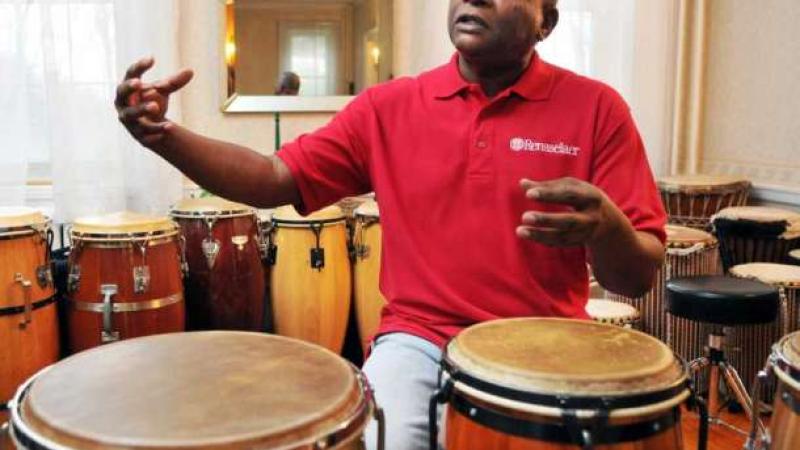February 11, 2014

Rensselaer professor Eddie Ade Knowles will be featured in a documentary about renowned jazz and soul artist Gil Scott-Heron airing Wednesday night.
Knowles, an accomplished drummer, was a member of Gil Scott-Heron and the Midnight Band in the 1970s. He played the conga drums that were the beat behind one of Scott-Heron's most notable works, "The Revolution Will Not Be Televised."
"(Scott-Heron) had never done poetry with drums and so we spent some time in terms of how to do this with conga drums being played," Knowles says in a preview of the documentary.
The documentary “Unsung: Gil Scott-Heron” airs at 10 p.m. Wednesday, Feb. 12, on TV One, channel 184 on Time Warner Cable locally.
UPDATE 2/12:
I spoke to Knowles today (Wednesday) and he gave me some more details about how he and Scott-Heron came to work together. The met at Lincoln University in 1968 when Knowles was a transfer student and Scott-Heron was a freshman. Knowles was in Scott-Heron's band until 1975.
"When we started working together as students at Lincoln … we were just really continuing to develop a legacy that already existed there," Knowles said. Lincoln is the oldest historically black university in the country and has a lengthy roster of notable graduates, including Supreme Court Justice Thurgood Marshall and acclaimed poet Langston Hughes.
"What stands out most in working with Gil was his willingness to embrace the drum as a nexus for communication," Knowles said. Throughout the late 60s and early 70s as they performed together, often with several other drummers, Scott-Heron's signature style of poetry backed by drumming began to take shape. Knowles performed with Scott-Heron until 1975.
The content of his work was as important as the style, Knowles said, and still resonates today. "To me, many of the issues that Gil spoke about are still present today, some things have actually come full circle."
Knowles said he hopes the documentary exposes younger people to Scott-Heron's body of work.
He recorded his interview in July and did not view the completed documentary before the air date.
"What I am interested to see is how they will portray this life that was very complicated," Knowles said. "It’ll be interesting to watch this and, being as close as I was to Gil, it’ll be interesting to see if they get it right." In the years before his death in 2011, Scott-Heron struggled with drug addiction and served two drug-related prison sentences. [Read his obituary in the New York Times, The Guardian, and Rolling Stone.]
Scott-Heron's legacy of educational, provocative, and challenging work transcends his complicated life, Knowles said.
"Clearly the work has continued to live on," Knowles said, referencing, in particular, Kanye West's sampling of Gil Scott-Heron's "Comment No. 1" (featuring prominently Knowles' drumming) in his 2010 song "Who Will Survive in America" (Note: You'll find some adult language if you click that link.)
END UPDATE
"The Revolution Will Not Be Televised" is one of Scott-Heron's most famous and is probably recognizable to most people, here's an excerpt:
"You will not be able to stay home, brother.
You will not be able to plug in, turn on and cop out.
You will not be able to lose yourself on skag and skip,
Skip out for beer during commercials,
Because the revolution will not be televised.
.....
The revolution will not go better with Coke.
The revolution will not fight the germs that may cause bad breath.
The revolution will put you in the driver's seat."
Click here to read the full piece.
"The timeliness of the message gave it real significance, currency, within the movement," Knowles says in the documentary.
Click here to watch a preview of the documentary (fyi: there's a 30-second commercial that plays before the video clip).
Drums have been the beat behind Knowles' entire career. At Rensselaer, he has taught African and Afro-Cuban music. The ongoing interest of students who had completed his courses led him to found Ensemble Congeros, an ensemble of Rensselaer alumni and students who study and perform Afro-Cuban, African, and New World percussion, in 2004.
More recently, he has also founded The Roots of Africa Music Ensemble, a five-member group that will have its first public performance at 6:30 p.m. Thursday, Feb. 20, at the opening of the Black Student Alliance's Annual Black History Month Art Exhibit in Shelnutt Gallery in the Rensselaer Union.
Now a Professor of Practice in the arts department of the School of Humanities, Arts, and Social Sciences, Knowles held the post of Vice President of Student Life and Adjunct Faculty until 2011.
Read more about Knowles' lifelong passion for drumming in this Times Union article.
Want to hear more from Knowles? Listen to his WAMC interview with Joe Donahue and Alan Chartock in which he explains in much more detail the courses he now teaches and the work he does with Ensemble Congeros.
Here's my favorite quote from that interview:
"At Rensselaer, sometimes people think that we're all about just the science and the technology, they don't realize that the big A for Arts is a key aspect of what we're about as an institution, which is why EMPAC serves, if you will, as a major platform for us because in fact it is about science, technology, and the arts, and the synergy between those three that takes place with this building being representative of that."
